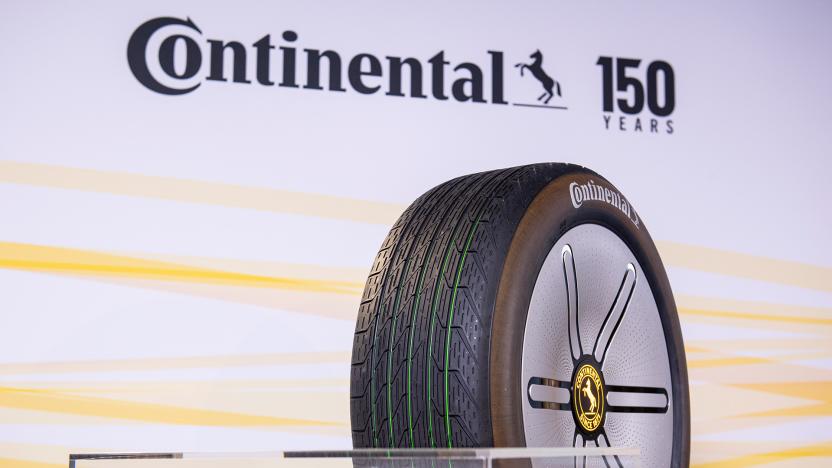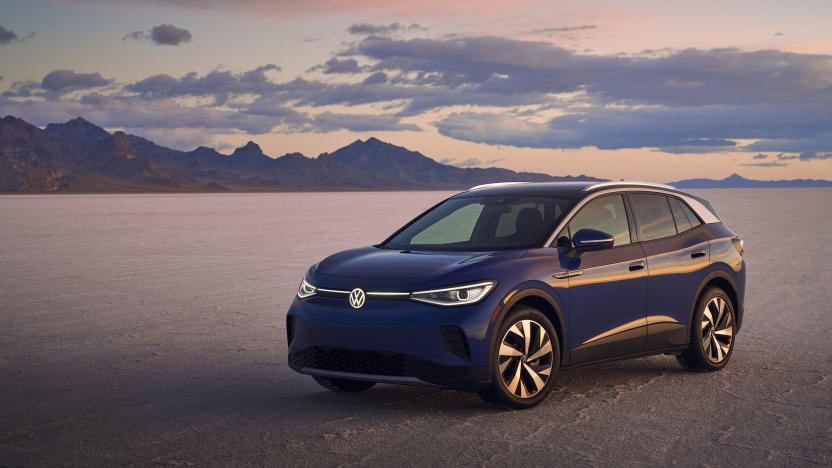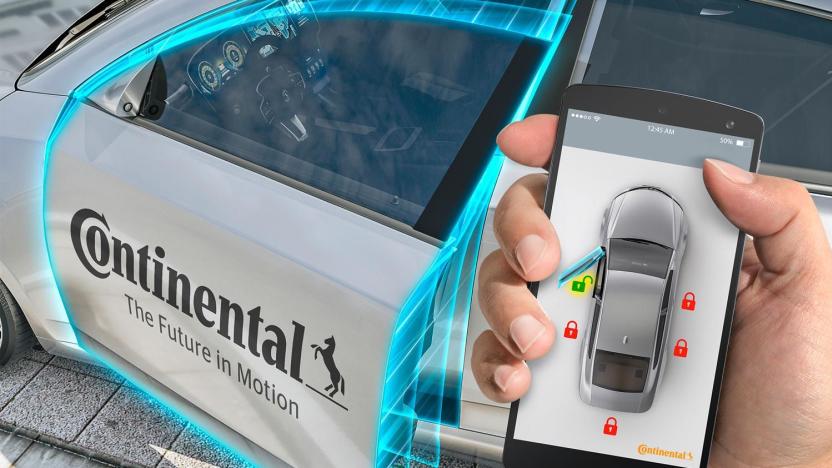Continental
Latest

Continental's eco-friendly concept tire includes a renewable tread
Continental has unveiled a concept tire with a renewable tread and renewable materials like dandelions and rice husks.

How the rising popularity of EVs could lead to a resurgence of drum brakes
Drum brakes are some of the automotive industry's oldest technologies. They have been falling out of favor with automakers for years but are now poised for a resurgence thanks to the rising popularity of EVs.

Sennheiser and Continental's speakerless car audio sounds great
Yesterday, automotive tech company Continental announced a slew of futuristic car enhancements, but one that really caught our attention was a new in-car spatial audio system using Sennheiser's Ambeo 3D audio. What really makes it interesting, though, is the fact that it doesn't use traditional loudspeakers. Instead, it uses Continental's "Ac2ated" technology to physically stimulate various surfaces in the car; that stimulation makes them produce sound, the same way plucking piano or guitar strings causes the instrument's body to resonate with sound. It's a weird concept, a demo at CES Continental held for the press showed the technology really works.

Your next car could feature a 3D-projected center display
Continental executives took to the stage on Monday at CES to regale the assembled crowd with their vision of a safer, smarter and more connected driving future.

Sennheiser brings Ambeo 3D audio to cars with Continental sound systems
Sennheiser's Ambeo 3D audio technology has been packed into everything from soundbars to headphones to AR devices. It will soon be available in cars too, without the need for speakers, thanks to Sennhesier's vehicle audio system created in partnership with automotive company Continental.

'Digital Key' standard uses your phone to unlock your car
You can already use your smartphone as a car key if you own the right vehicle (just ask Tesla Model 3 owners). There hasn't really been a common standard for it, though, and that has hurt adoption -- you can't guarantee that you'll have phone access if you switch brands, or even individual models. You might soon have a solution. The Car Connectivity Consortium, a mix of major smartphone and automotive brands, has posted a Digital Key 1.0 standard (PDF) that will let you download (what else?) a virtual key that can unlock your vehicle, start the engine and even share access with other drivers.

Avis is testing a system that unlocks a rental car with your phone
Avis announced today that it has teamed up with Continental to bring keyless car rental to its customers, Roadshow reports. As part of a pilot program taking place in Kansas City, the company has equipped some of its cars with Continental's Key-as-a-Service technology, which allows users to lock, unlock and start their rentals with just a smartphone and the Avis app.

Self-driving car demo is the first to cross the US-Canada border
As a rule, self-driving car tests tend to be limited to the country where they started. But that's not how people drive -- what happens when your autonomous vehicle crosses the border? Continental and Magna plan to find out. They're planning to pilot two driverless vehicles all the way from southeastern Michigan to Sarnia, Ontario, making this the first cross-border test of its kind. The machines won't be in complete control for the entire route, but they'll use a combination of cameras, lidar and radar to take over when they can, including two key border crossings (the Detroit-Windsor Tunnel and the Blue Water Bridge).

Tires with built-in sensors keep a watchful eye on tread wear
Continental is bolstering its Tire Pressure Monitoring System (TPMS ) to not only monitor your tire pressure but its tread depth, too. As your tires age and change shape, so does the way they roll and interact with the road surface. Continental's clever system keeps track of these differences and compares them over time with model-specific stored data. When your tires eventually hit some pre-determined threshold, the car will notify you that your boots have reached their end of life. Continental expects this to roll into retail for the 2017 season in cars equipped with its TPMS systems. But fret not, you can always use that old standby -- your eyes -- to actually look and see if the tread wear indicators are flush with the tire surface. If they are, remember it's safety first, so go get yourself a new set. [Image credit: Continental]

United activates ViaSat's blazing-fast satellite WiFi on select 737s
JetBlue's Fly-Fi satellite internet has been online since November, but while a handful of United's 737s have been equipped with the necessary components to launch its own version of the service for the same period of time, that legacy carrier has kept passengers in the dark. Until this week. According to travel blogger Wandering Aramean, United has since flipped the switch on its latest WiFi effort. But unlike the Gogo available on its transcontinental 757s and the Panasonic satellite-based service aboard select A319, A320 and 747 aircraft, this latest version connects to the ultra-fast ViaSat-1 satellite, letting you surf at 30,000 feet with speeds you'd normally only find on the ground. We tested the same connection aboard a JetBlue A320 in November, and unlike United's existing connectivity options, which are often sluggish and spotty, this service flies. Unfortunately it's not clear where to find the Ka-band-equipped aircraft today, but if you're on a United 737 with DirecTV, there's a small chance it'll also have ViaSat satellite WiFi onboard. We're also not sure of pricing -- JetBlue is charging an introductory rate of $9 per hour for faster service, with basic connectivity available for free for the next few months, but United has yet to confirm its own fee structure. Based on the airline's current satellite WiFi pricing, we'd expect the new service to run between $10 and $15, depending on the length of your flight. We're of course eager to get onboard, so if you happen upon a United 737 with super-fast internet, please mark the tail number and give us a holler.

Report: Google to develop automated driving system with Continental and IBM
Both Google and German auto supplier Continental made Nevada their high-tech vehicle testing grounds in 2012, but who'd have thought the companies might end up collaborating? According to German newspaper Daily Frankfurter Allgemeine Zeitung, the tech giant is very close to inking a deal not only with Continental but also with IBM. The paper's sources didn't go into specifics, only that the trio will collectively cook up an automated driving system for cars. It's worth noting that what Continental tested in Nevada was a driver assist technology that makes it easier to navigate traffic. Whether Google is bringing the firm onboard to fine-tune its own self-driving car system or whether the companies will work on something new remains to be seen. However, if the deal does go through, we'll know at least some of the juicy details in September, as Continental plans to officially debut the collaboration at the Frankfurt Car Show.

Continental gets automated vehicle approved for Nevada roads
Google isn't the only outfit puttering around Nevada roads with its hands off the wheel -- German automotive supplier Continental has the state's approval to let the computer take the wheel, too. Earlier this week the Silver State signed off on the German company's safety, employee training, system function and accident reporting plans, granting Continental a testing license and adorning its vehicles with red license plates. It's the very same treatment Mountain View received back in May -- but Continental's cars aren't exactly direct competitors to Google's fare. The company's "highly automated vehicles" are more of an advanced cruise control system than a self driving car -- capable of navigating stop and go traffic on a freeway, for example, but still requiring the driver to take control as their exit draws near. Continental sees the partially autonomous vehicle as a stepping stone to fully automated cars, and plans to offer the partial solution between 2016 and 2020, switching up to fully automated driving systems by 2025. The company hopes refine its testing to meet this goal in Nevada, putting its stereo camera and sensor equipped vehicle through freeway and rush-hour trials in real traffic. The company's ultimate goal, of course, is to eliminate accidents and fatalities on the road. Check out the firm's official PR after the break.

In-flight WiFi coming to 300 United and Continental aircraft beginning in mid-2012, entire fleet covered by 2015
Planning to fly on United or Continental at any point over the next few years? Then it looks like your odds of having in-flight WiFi will be getting increasingly better. United Continental Holdings announced today that it's signed an agreement with Panasonic Avionics Corporation to bring satellite-based WiFi connectivity to more than 300 of its aircraft beginning in mid-2012. Those aircraft will include Airbus 319 and 320 and Boeing 747, 757, 767, 777 and 787, and the company says it expects its entire mainline fleet to be covered by 2015. No specific word on any additional content or services that will come with it (or a cost, for that matter), but the company promises that the system will "enable wireless streaming of video content."

Continental readies stereo camera system for 'seeing' cars
The idea of cars preventing accidents before they happen isn't novel, but at the end of the day, collision detection systems are only as smart as the information being fed to them. That's the ethos behind Continental's new stereo camera system, which spots people, pets, and other objects in a vehicle's path, and measures their height, distance from the vehicle, and how they might be moving. This rig, which will be just another part of Continental's ContiGuard safety system, uses the difference in the lenses' optical paths to make these calculations -- so long as those obstacles are 20 to 30 meters (66 to 98 feet) away. The company also says the cameras are sharp enough to detect partially obscured objects, and claims accuracy within 20 to 30 centimeters (8 to 12 inches). No word on when it will be ready to ship seeing cars, though if the press release is any indication, German drivers are likely to get their test drive first.

Continental to launch in-flight WiFi in 2010
Looks like Continental is the latest to inch closer to our dream of WiFi on every flight: the airline just announced that it'll be rolling out Gogo in-flight internet service on 21 Boeing 757-300s in its fleet starting in Q2 2010. The service will cost $4.95 and up based on flight length, and the 757s in question mostly serve domestic routes -- we're hoping Continental takes a cue from American and US Airways and lets passengers check to see if their plane is WiFi-enabled.

AutoLinQ initiative taps Android for new connected car initiative
This is a bit of a wild one: some very disparate companies are (apparently) teaming up to conquer the car, Microsoft Sync style. Details are a bit slim at the moment, but Continental Auto Group has announced plans to build what they're calling "the connected car." The new hardware and software system "leverages" the Android Marketplace, and encompasses car-friendly APIs, car-specific in-vehicle apps and a touchscreen interface plugged into a system designed to pull data from the web and control internal car systems. On a sketchier front, Phandroid has done some mucking around, and seems to think Google, BMW, T-Mobile, Wind River and SVOX are all on the short list for involvement. It's hard to say exactly how likely that might be, but we're happy to dream electric dreams of an OHA-style Sync killer along with them. Another shot is after the break.[Via Phandroid]

Mercedes S400 BlueHybrid aims to be first to use Li-ion battery
There's a decent chance your average hybrid owner wouldn't know the difference between a lithium-ion and nickel-metal hydride battery if their life depended on it, but we know you -- dear reader -- are not one of those "average" joes / janes. That being the case, you may be interested to know that the 2009-bound S400 BlueHybrid is in prime position to be the world's first production Li-ion hybrid, which will offer up "compact dimensions and far superior performance" compared to existing rivals. M-B goes on to trumpet the technology's "high ampere-hour efficiency, long service life, and great reliability, even at very low temperatures." No word on just how astronomically high this thing will be priced at, but you can expect just shy of 30 miles-per-gallon in mixed driving conditions, for what it's worth.

Continental rolling out DirecTV, IM, and email to 225 planes
In another mostly positive step for in-flight entertainment options, Continental Airlines will be rolling out DirecTV along with email and IM service on 225 of its planes starting next January -- the majority of its domestic fleet, according to Reuters -- although watching some tube will reportedly cost economy passengers six bucks-a-pop. Continental is teaming up with LiveTV on the venture, a subsidiary of JetBlue which also provides that airline with DirecTV, XM, and, more recently, limited Yahoo email and IM services courtesy of its 800MHz bandwidth acquisition. LiveTV will both provide and install a majority of the in-plane hardware in exchange for most of the revenue from economy section TV viewers; the 36 DirecTV channels will be free to first class passengers, and anyone with compatible devices and a Yahoo account can connect to the flying hotspots.[Via Reuters]

Continental telematics safety system alerts drivers of impending hazards
It's fairly safe to say that Continental Automotive Systems isn't the only company out there conjuring up an in-car safety system to alert motorists of impending hazards, and while a certain sect (we jest, we jest) would likely ignore whatever great advice it's sure to give, we can still admire the effort here. Dubbed a "car-to-car and car-to-infrastructure telematics application," the system's goal is to alert drivers in advance of potential perils such as poor traction conditions, an approaching ambulance / emergency vehicle, or a road-block ahead that could induce fits of frustration. The developments are reportedly right in line with the US government's Vehicle Infrastructure Integration (VII) Initiative, and we're sure officials are mighty proud of the E-Flare, which provides optical and acoustic warnings coupled with a force-feedback gas pedal, and E-Horn, which accepts incoming warning signals from emergency vehicles and alerts the driver via (presumably distracting) in-cabin lights and sounds. No word just yet on when our next whip will sport a few extra senses, but rather than make things easier on us to control, why not jump straight to autopilot?[Photo courtesy of Continental]

FCC rules to reinstate free WiFi at Boston-Logan International Airport
Although the Federal Communications Commission isn't exactly known for ruling in favor of popular consumer desire, even we have to give a hearty round of applause to the traditionally nettlesome agency for its edict in the WiFi battle at Boston-Logan International Airport. The Massachusetts Port Authority (better known as Massport) had ordered airlines that were providing wireless internet free of charge in their customer lounges to pull the plug in favor of fee-based services in 2005, but as we expected, the FCC overturned the pronouncement and agreed that the agency's "OTA reception devices regulations" allowed airlines to offer WiFi gratis. In a staggeringly pro-consumer remark, the Commission's commissioner insinuated that open internet access was meant to be free and readily available to travelers "who can make productive use of their time while waiting to catch their next flight." Bravo FCC, bravo.












